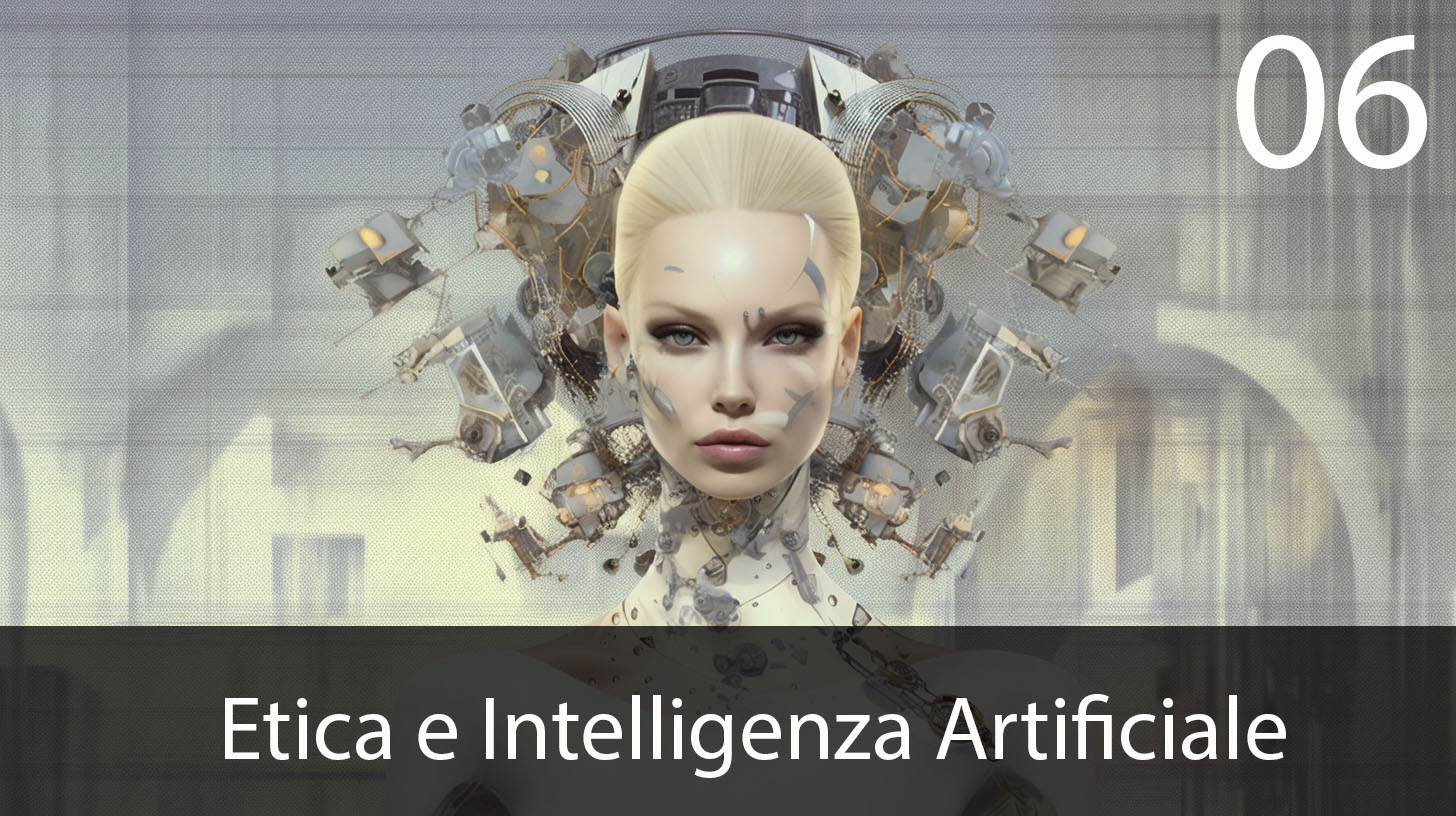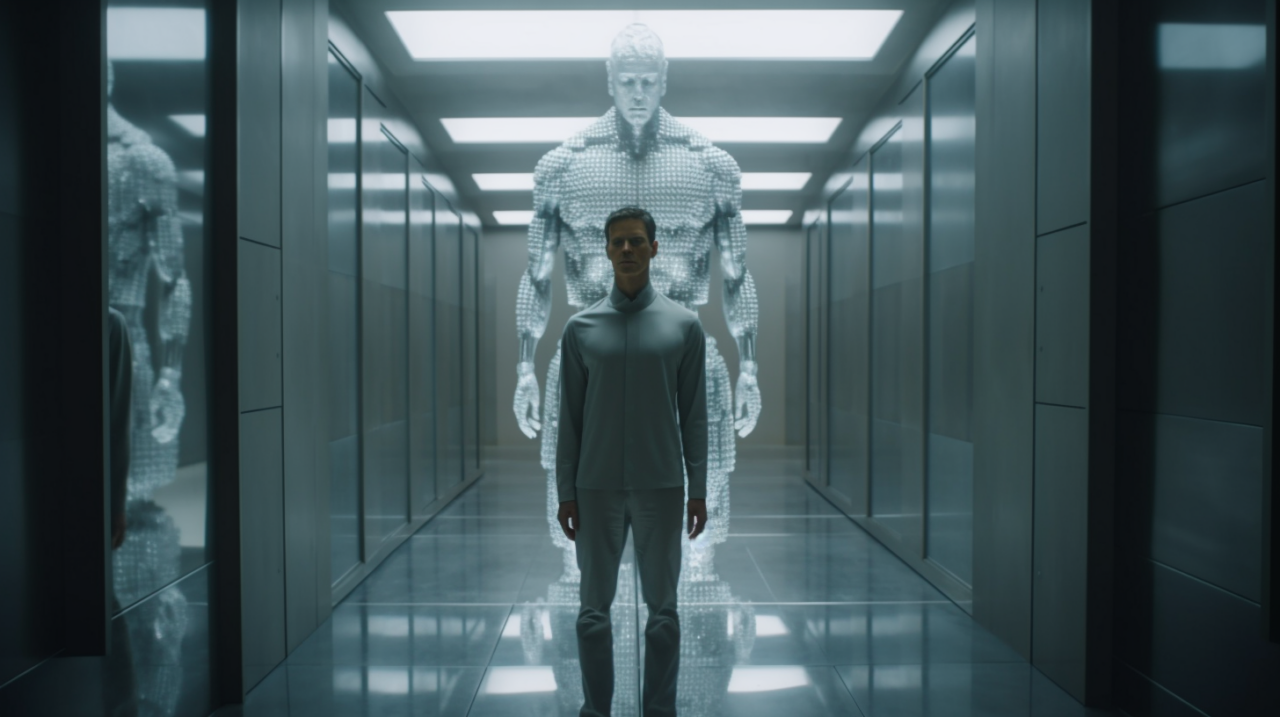Negli ultimi anni la crescente diffusione dell’intelligenza artificiale ha acceso il dibattito sull’etica e sui valori che dovrebbero guidare lo sviluppo e l’implementazione di queste tecnologie. Gli aspetti etici legati all’AI coinvolgono diversi ambiti: dal modo corretto di addestrare e utilizzare gli algoritmi fino alle conseguenze più ampie sulla società e sul lavoro umano.
Per chi si occupa di etica dell’intelligenza artificiale uno dei punti centrali riguarda l’interpretabilità e la trasparenza degli algoritmi. Ci si chiede infatti se le decisioni prese dai sistemi di IA debbano essere comprensibili e giustificabili per gli esseri umani, e in caso affermativo come garantirlo. La cosiddetta “scatola nera” degli algoritmi di apprendimento automatico genera infatti dubbi sull’equità e la correttezza delle loro decisioni.
Il PROMPT dell’immagine, generata con MidJourney:
Visualize a scene that represents the ethical concerns surrounding the interpretability and transparency of AI algorithms. The content should be a large, opaque box (representing the “black box” of machine learning algorithms) with a human figure standing in front of it, trying to peer inside. The box is emitting a bright, mysterious light, symbolizing the complex and often inscrutable decisions made by AI systems. The medium should be photo hyper-realism, with a style that combines the stark aesthetics of modern technology with the humanistic undertones of the subject matter. The lighting should be dramatic and contrasting, highlighting the opaque box and the human figure. The colors should be a mix of cold metallic hues and bright whites. The composition should be a centered shot, capturing the box and the human figure. –ar 16:9 –v 5.1 –style raw –q 2 –s 750
Altro tema cruciale è la protezione della privacy nell’era dei big data. Le grandi quantità di informazioni personali raccolte per addestrare l’IA sollevano questioni etiche relativamente alla raccolta consensuale e alla gestione trasparente dei dati, nonché al loro utilizzo in modo socialmente benefico.
L’equa distribuzione dei benefici dell’AI è un altro punto saliente: la riflessione etica deve infatti porsi il tema della riduzione delle disuguaglianze e della massimizzazione del benessere globale.
Il PROMPT di questa immagine e della immagine successiva, generate con MidJourney:
Cinematic shot. A scene that encapsulates the concept of equitable distribution of AI benefits. The content should be a large, futuristic tree, its branches laden with glowing orbs of different colors, each representing a unique benefit of AI. Diverse groups of people are gathered around the tree, each receiving an orb from the tree. The medium should be photo hyper-realism, with a style that combines the organic beauty of a tree with the futuristic aesthetics of AI. The lighting should be soft and diffused, casting a warm glow on the scene. The colors should be a mix of natural greens and browns for the tree, and vibrant hues for the glowing orbs. The composition should be a wide shot, capturing the entire tree and the people gathered around it. Use a 16k camera for highest detail level. Tim Walker style –ar 16:9 –v 5.1 –style raw –q 2 –s 750
Eticisti e filosofi dell’intelligenza artificiale dibattono anche sull’impatto di queste tecnologie sull’essere umano e sull’identità stessa dell’uomo. L’automazione di molti compiti tradizionalmente umani solleva interrogativi sulla nostra autonomia, responsabilità e capacità di scelta. Non è ancora chiaro fino a che punto l’intelligenza artificiale trasformerà il modo in cui pensiamo noi stessi come esseri coscienti ed autonomi.
In parallelo emergono dubbi circa la possibilità che le macchine sviluppino forme primitive di coscienza, e se in tal caso esse dovrebbero godere di alcuni diritti morali. Si pone inoltre il problema di definire chiaramente confini e limiti di autonomia delle intelligenze artificiali. In tutti questi ambiti, i valori umani fondamentali come dignità, libertà e giustizia devono guidare lo sviluppo responsabile dell’IA.
Il PROMPT dell’immagine, generata con MidJourney:
Cinematic shot. Use a 16k camera for highest detail level. A scene that symbolizes the dualism of man and machine. The content should include a large mirror in the center of the frame, with a human figure on one side and an AI entity on the other, both looking into the mirror. The reflection in the mirror shows the human and AI as one, symbolizing the merging of artificial intelligence and consciousness. The medium should be photo hyper-realism, with a style that evokes the introspective nature of the subject matter. The lighting should be stark and direct, emphasizing the mirror and the figures. The colors should be a mix of stark whites, deep blacks, and transparent blues for the mirror. The composition should be a centered shot of the mirror, with the figures on either side. Helmut Newton style –ar 16:9 –v 5.1 –style raw –q 2 –s 750
La riflessione etica rappresenta una componente indispensabile della ricerca nell’ambito dell’intelligenza artificiale. Solo attraverso un ampio dibattito sui valori che dovrebbero ispirare queste tecnologie e sulle loro implicazioni per la società nel suo complesso sarà possibile guidare uno sviluppo dell’AI realmente centrato sul benessere umano. L’intelligenza artificiale solleva sfide etiche inedite ma offre anche nuovi spunti per ridiscutere i fondamenti stessi della morale e dell’essere umano.
L’etica dell’intelligenza artificiale ruota attorno a nodi concettuali complessi ma essenziali come autonomia, responsabilità, equità, privacy e benessere. Solo affrontando queste sfide con una visione ampia e inclusiva che unisca scienza, filosofia ed umanesimo potremo guidare lo sviluppo tecnologico verso esiti coerenti con i nostri valori umani fondamentali.






Dal punto di vista etico spero che le possibilità offerte dall'AI vengano messe al servizio dell'umanità, per il bene di tutti senza creare ulteriori discriminazioni e divari.
Grazie per l'articolo, molto interessante